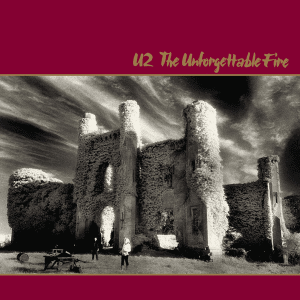About "The Unforgettable Fire" (1984)
 The Unforgettable Fire is the fourth studio album by Irish rock band U2. It was produced by Brian Eno and Daniel Lanois, and released on 1 October 1984 by Island Records. The band wanted to pursue a new musical direction following the harder-hitting rock of their previous album, War (1983). As a result, they employed Eno and Lanois to produce and assist in their experimentation with a more ambient sound. The resulting change in direction was at the time the band's most dramatic. The album's title is a reference to "The Unforgettable Fire", an art exhibit about the atomic bombing of Hiroshima.
The Unforgettable Fire is the fourth studio album by Irish rock band U2. It was produced by Brian Eno and Daniel Lanois, and released on 1 October 1984 by Island Records. The band wanted to pursue a new musical direction following the harder-hitting rock of their previous album, War (1983). As a result, they employed Eno and Lanois to produce and assist in their experimentation with a more ambient sound. The resulting change in direction was at the time the band's most dramatic. The album's title is a reference to "The Unforgettable Fire", an art exhibit about the atomic bombing of Hiroshima.Recording began in May 1984 at Slane Castle, where the band lived, wrote, and recorded to find new inspiration. The album was completed in August 1984 at Windmill Lane Studios. It features atmospheric sounds and lyrics that lead vocalist Bono describes as "sketches". "Pride (In the Name of Love)" and "MLK" are lyrical tributes to Martin Luther King Jr.The Unforgettable Fire received generally favourable reviews from critics and produced the band's biggest hit at the time, "Pride (In the Name of Love)", as well as the live favourite "Bad". A 25th anniversary edition of the album was released in October 2009.
"The Unforgettable Fire" full album by U2 is property and copyright of its owners and it's embedded from Youtube.
Information about "The Unforgettable Fire" is automatically taken from Wikipedia. It may happen that this information does not match with "The Unforgettable Fire".
SONGSTUBE is against piracy and promotes safe and legal music downloading. Music on this site is for the sole use of educational reference and is the property of respective authors, artists and labels. If you like U2 songs on this site, please buy them on Itunes, Amazon and other online stores. All other uses are in violation of international copyright laws. This use for educational reference, falls under the "fair use" sections of U.S. copyright law.
